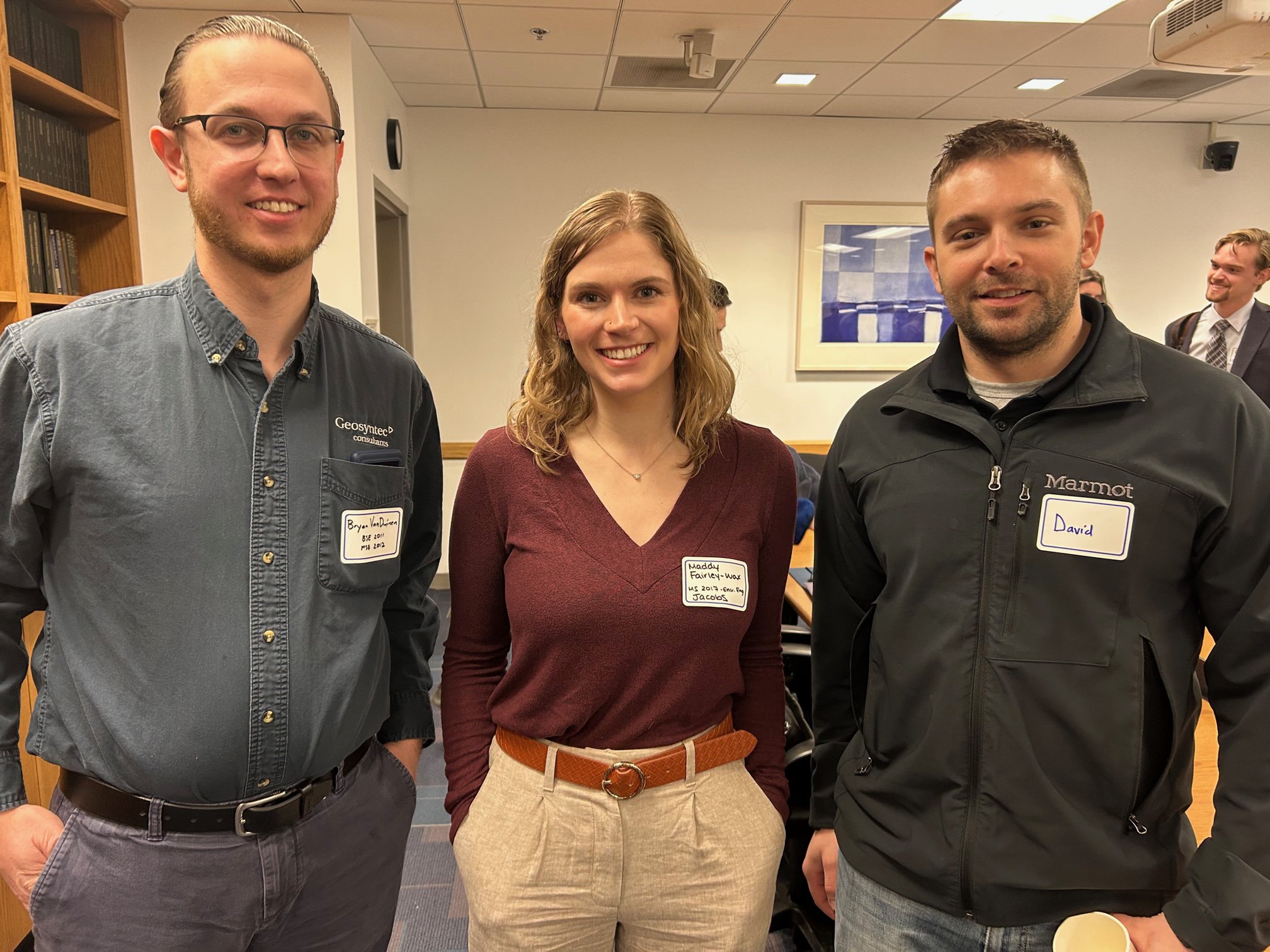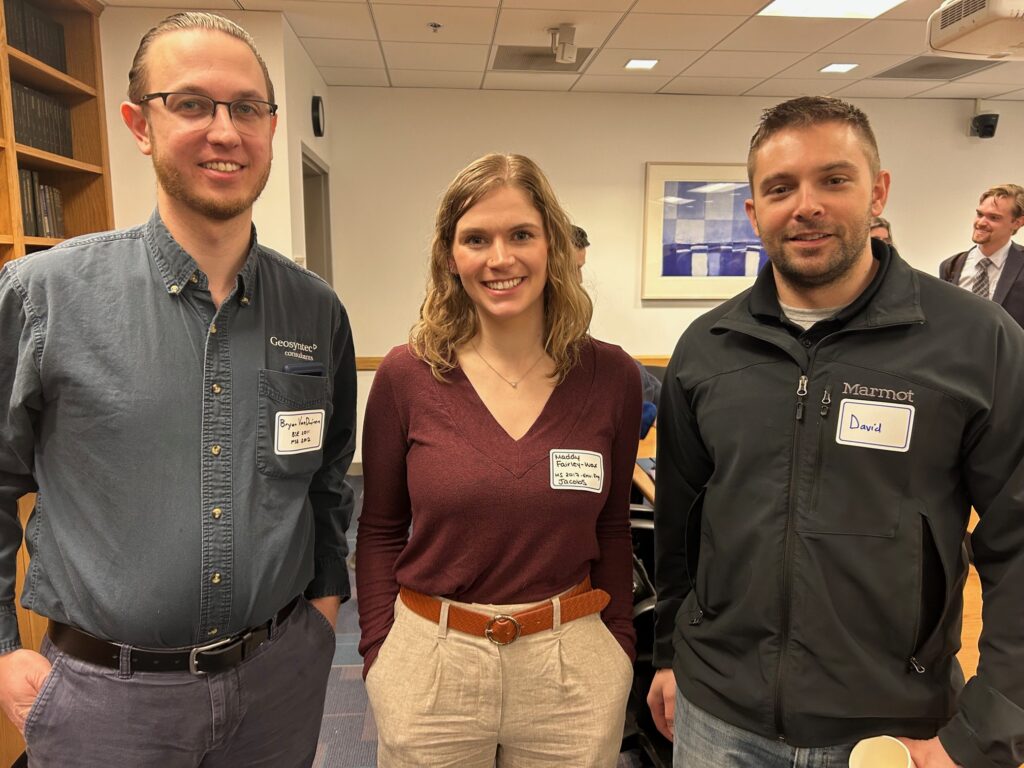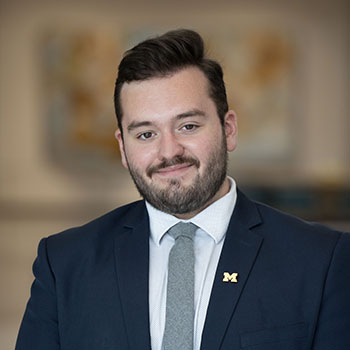
Visit Day Alumni Panelists Highlight the Value of a CEE Master’s Degree
Three graduates discussed how their education prepared them for the profession and how prospective CEE Master’s students can differentiate themselves through their studies.

Three graduates discussed how their education prepared them for the profession and how prospective CEE Master’s students can differentiate themselves through their studies.
U-M CEE recently welcomed admitted grad students for the department’s annual Visit Day. One highlight was a panel discussion for prospective master’s students, featuring three CEE Master’s alumni–David Quintal, Maddy Fairley-Wax and Bryan VanDuinen. CEE Associate Prof. Jeff Scruggs moderated the session.
“I have truly used something in my job from every class that I took during my Master’s program here,” said Fairley-Wax, a water resources engineer at Jacobs. “My (CEE courses) gave me a deeper understanding of fundamentals, and provided me with a technological advantage.” While pursuing her CEE Master’s, Fairley-Wax had the opportunity to conduct research into the Flint, Michigan, water crisis. She graduated in 2017 with a strong sense of her career goals. “I wanted to focus on environmental and water justice,” she said. “I use so much of what I did here in my day-to-day work.”
Quintal, a 2014 CEE Master’s graduate, studied geotechnical engineering. In his career at McDowell & Associates, he focuses on geotechnical engineering and site development. Quintal found the seminar presentations, where guest engineers speak to students as part of their classes, to be beneficial. He added that earning a Master’s degree prepares graduates for lifelong learning. “You don’t stop learning about engineering the day you leave college,” he said.

VanDuinen, who works at Geosyntec Consultants, agreed on the importance of professional development and lifelong learning. He completed his CEE Master’s in 2012 and is an environmental engineer who deals with contaminated site assessment and remediation. He noted that technical writing and critical-thinking skills are fundamental. “It’s good to have a baseline understanding of the physical information, but you have to be able to synthesize data and make connections to solve problems,” he added. “This ability is a great differentiator when prospective employers are interviewing job applicants.” VanDuinen noted that AI is an area of increasing focus that will provide the industry with many opportunities.
Fairley-Wax added that the incorporation of AI and the work of municipalities as they build digital twins means that incoming engineers need to have a “strong understanding of the discipline and foundational instruction.” Supporting the other panelists’ statements about the importance of lifelong learning, Fairley-Wax, a licensed engineer, said, “You can expect a good company to help train you when you start a new job. There will still be learning after your graduation.”
Although grades are a necessary measure of student understanding, they are not the only factor prospective employers weigh when making personnel decisions. VanDuinen said that having an active leadership role in a student organization or performing research with a professor are key indicators of a job candidate’s strength. “To perform those tasks successfully, the person has gained experience in critical thinking, data analysis and problem solving,” he said.
Fairley-Wax and Quintal agreed. Fairley-Wax said that creativity and curiosity are important traits for a new engineer, and Quintal said that new hires should not think any job is “beneath” them. “Look to start at the bottom and learn many jobs along the way to gain a stronger understanding of engineering fundamentals,” he said, adding that having work experience prior to beginning a Master’s path can reinforce learning. “You can use your experience to inform your studies, and likewise, can use your coursework in applications on the job.”
“In undergrad studies, you learn how to learn,” VanDuinen said. “In a Master’s program, you learn how to think.” Prof. Scruggs agreed and said that students in undergraduate programs generally are given directions in the way to produce a result. However, in grad school, “students have to figure things out by synthesizing everything they have learned and develop their own processes to solve problems.”
“At universities across the US, not all MS programs are the same in this regard,” said Prof. Scruggs. “I like to think that our CEE MS programs at U-M really push students to develop the confidence and intellectual independence to create new techniques and methodologies. Being able to do this sets our graduates apart, and sets them on the path to become the next generation of thought-leaders in their professions.”
When asked about job prospects for incoming engineers, the panelists believe opportunities are strong. Fairley-Wax noted that not many new engineers were hired in the 2008 recession. The lower number of new hires 15 years ago means there are now fewer mid-career engineers. “That has left a gap of mid-career engineering talent that organizations are still trying to replace,” she said. She added that “a crumbling infrastructure and the willingness to fund its improvement” have led to a desperate need to fill engineering positions with qualified candidates. VanDuinen said that “many of society’s big challenges are engineering challenges,” so there is a key role for professionals to play in addressing those needs.
All of the panelists believe that a Master’s degree provides job applicants with an advantage. Quintal said,” With a Master’s degree, you will be able to identify issues in the bigger picture that people in your organization with only a bachelor’s degree will not see.” VanDuinen agreed. “Having a Master’s degree will often open more doors for you.” He also said that students should use their time at U-M CEE to make connections and network with faculty and other students.
Fairley-Wax encouraged students to balance studying with exploring the U-M campus and Ann Arbor. She noted that Michigan provides students with many opportunities to hear speakers and engage with the surrounding community in topics as diverse as entrepreneurship, public policy and public health.

Marketing Communications Specialist
Department of Civil and Environmental Engineering